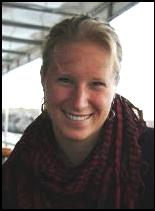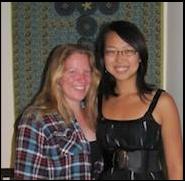
|
Fellows’ Flyer |
|
January/February 2012 |
|
News and views for and by Princeton in Africa Fellows |
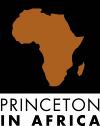

|
Alec and a proud Generation Rwanda graduate |

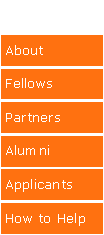

|
“Esprit!” “Courage!” I’m greeted by cries of encouragement as I jog up the twisting, jagged dirt roads of Nyamirambo, my bustling neighborhood that we lovingly call “the Brooklyn of Kigali.” The street is crowded with men carrying loads of cassava tottering on their heads to the market and uniformed children shouting “muzungu” (white person), or polite choruses of “good morning!” I glance at the sunrise hitting the tops of the terraced green hills that stretch as far as I can see, and I can’t help but feel in awe of the amazing country where I live. When I first learned of my placement in Rwanda, like many others, my mind conjured up grainy video news clips depicting unspeakable violence and war. Nevertheless, the Rwanda I’ve experienced first-hand seems nothing short of a miracle. Fifteen years ago, Rwanda was a failed state, still reeling from the genocide and completely dependent on foreign aid. Today, businesses are scrambling to invest as Rwanda boasts some of the highest GDP growth rates, greatest stability, and least corruption in the region; not to mention it’s ranked one of the best places to start a business in the world. Rwanda is a tiny land-locked country with no natural resources, but limitless human potential. The same strength, unity, and ambition driving development today have always been there, struggling to break free from the cycle of violence and upheavals. Studying economic development as an undergrad, it was easy to get swept up in various indices, and lose sight of what’s really driving progress. The numbers and statistics don’t mention things like umuganda, the national custom under which where every single Rwandan of age in the country goes out on the 3rd Saturday of each month and participates in communal community service. For the past 6 months, I have been working for Generation Rwanda, a local NGO which provides university scholarships, trainings, and other supplementary programs for orphans of the genocide and socially vulnerable youth. I have a wide range of responsibilities, everything from running entrepreneurship trainings to helping coordinate our nation-wide student selection. Generation Rwanda is the most all-inclusive and competitive scholarship in the country, and the extremely talented students who enter our program are nothing short of inspiring. I feel so lucky that I have the opportunity to interact daily with the most amazing young people; who saw the worst of humanity and came of age in the aftermath, yet have such lofty ambitions and love for their country. Students like Germaine, an orphan studying at Kigali Health Institute, who juggles her academics with running her own social enterprise: selling handbags produced by widows and HIV positive women. Germaine, and the other GR scholars, have essentially eliminated any excuse I might have for not achieving all I want from life. The spirit and courage of Rwandans like Germaine will have a had a lasting impact on me, whether I’m struggling up the last hill on my morning run, or any other obstacle that life may throw at me. |
|
PiAf Fellow Jessica Annis hiking in the Drakensberg Mountains during her holiday break |
|
The staff of Ubuntu Africa after the annual staff holiday luncheon in Strand, South Africa (Jessica is second from right) |
|
Alec posing in the tea fields in the southwest of Rwanda |
|
Tel: 609.258.7215 Fax: 609.964.1818 piaf@princeton.edu |
|
Mailing address: Post Office Box 226, Princeton, NJ 08542 Street address: 194 Nassau Street, Suite 219, Princeton, NJ 08542 |
|
Erin at her desk in the African Impact office |

|
A large van slowly pulls up to the front gate; soon after the sliding door slams. Children trickle into the Ubuntu Africa center while the post-lunch silence of the office fades. The four-room center is quickly overwhelmed with the giggles and chatters of children playing in the next room. Every afternoon between 3:00 and 3:30 pm the center is quickly transformed from a quiet workplace to one filled with clapping games, jokes and the occasional, spontaneous dance party. Each one of the 180 children enrolled in Ubuntu Africa’s program is HIV-positive, although you may not realize it based on the exuberance and excitement in the eyes of the children. Ubuntu Africa aims to provide comprehensive care to HIV-positive children in South Africa’s second-largest township, Khayelitsha. The South African government mandates that all HIV-positive individuals receive life saving treatment in the form of antiretroviral therapy, however we fill the gap between clinic and home by ensuring that our children receive adequate social and emotional support through our multidisciplinary program. As a Princeton in Africa fellow at Ubuntu Africa, I work with our local staff to expand our afterschool education curriculum. While our core focus has been HIV-education, we hope to expand our curriculum to include age-appropriate, early childhood education for our younger children as well as life skills training for our adolescents. I have also been working with our staff to create regular reporting mechanisms and a simple database to ensure accurate impact assessment allowing us to continually improve our program. As with many small NGOs, I take on a variety of other tasks to assist with the work of the organization. In December I planned the children’s holiday party, which included performances by local magicians and a traditional, South African braai (BBQ). I also recently chaperoned a weekend outing to the Two Oceans aquarium. By far the most exciting part of the day, for both the kids and me, was watching the mesmerizing ragged-tooth sharks swim alongside aquarium divers who were casually feeding the other fish. Aside from my time at Ubuntu Africa, I have been fortunate to explore a bit of the surrounding region. During Ubuntu Africa’s holiday closure, I traveled to the Drakensberg Mountains, affectionately known to locals as “The Berg”. The Drakensberg Mountains are said to have inspired J.R.R. Tokien’s “Lord of the Rings” series and I can attest to their spectacular beauty. And unlike the more traditional holidays spent at home, I spent this Christmas snorkeling off the Bazaruto archipelago in Mozambique. While there are certainly challenges associated with working and living abroad, the previous six months have been enriching in a way I could not have previously imagined. I am constantly forced to reevaluate my beliefs and look for innovative ways to achieve our mission. I feel fortunate to have been given this opportunity and look forward to another exciting six months as a fellow with Ubuntu Africa.
|
|
by Julie Kornfeld, ‘11-’12 Fellow at World Lutheran Federation, Uganda |
|
Notes From The Field |
|
Highlights from 2011-2012 Fellows: Isabel Pike in Senegal, Erin Buchholtz in Zambia, Alec Jahncke in Rwanda, Jessica Annis in South Africa, Julie Kornfeld in Uganda and Rachel Quint in Ethiopia |
|
Erin hiking in Northern Province, Zambia with Mary Reid Munford, ‘10-’11 African Impact Fellow |
|
Notes from the Field |
|
by Jessica Annis, ‘11-’12 Fellow at Ubuntu Africa, South Africa |
|
Julie and her LWF co-workers in the Kampala headquarters |

|
News from the PiAf Office: —PiAf 2012 Africa Travel —PiAf Board Presidents: James F. Robinson and George Hritz —Princeton in Africa 2012-13 Fellowship Interviews —Blog of the Month: Emily Trautner at Plan Uganda
|
|
PiAf ‘s 2012 Africa Travel |

|
‘12-‘13 Interviews |

|
‘11-‘12 Fellows Jane Yang (IRC Kenya), Amanda Ramcharan (Nyumbani Village, Kenya) and Erin Buchholtz revel in the beauty of Victoria Falls in Livingstone, Zambia. |
|
PiAf Connections: PiAf Fellows And Alums Meet up At Home And around Africa |
|
PiAf’s ‘10-’11 Fellow Theresa Laverty (Mpala Kenya) & ‘11-’12 Fellow Jane Yang (IRC Kenya) meet up in Nairobi. |
|
A NYC PiAf gathering on Dec 30: Katy Glenn (‘05-’06 International Crisis Group), Hilary Robinson (‘07-’08 Plan Uganda), & ‘11-’12 Fellows Cydnee DeToy (mothers2mothers, S. Africa), Yassi Tamdji (Student Sponsorship Programme, S. Africa), Emma Impink (Boma Project, Kenya) and Mark Adams (KF, Zambia). Also pictured are PiAf staff Stephanie Hooper and Blair Blackwell. |
|
‘11-’12 PiAf Fellows Jane Yang (IRC Kenya) and Mark Adams (Kucetekela Foundation, Zambia) catch up in Lusaka. |
|
‘11-’12 Fellows Sheila Agiti (African Leadership Academy, S. Africa), Yassi Tamdji (Student Sponsorship Programme, S. Africa), Michael Traynor (Baylor Bristol-Myers Squibb Children’s Center, Lesotho) join ‘10-’11 Fellow Veda Sunnassee (African Leadership Academy, S. Africa) for lunch in Johannesburg. |
|
Julie at Namboole Stadium at the Uganda vs. Kenya 'Football' match |

|
Notes from the Field |
|
by Erin Buccholtz, ‘11-’12 Fellow at African Impact, Zambia |
|
In January, PiAf interviewed 130 candidates for 2012-13 fellowships. We were impressed by the high caliber of the candidates we interviewed and enjoyed getting to know each and every one of them. Once again we were humbled by the enthusiasm and passion of our candidates and the dedication of our panel of interviewers made up of former Fellows, board members and PiAf staff. PiAf is growing and we will have more fellowship posts than ever this year, allowing us to create an ever-expanding network of young leaders dedicated to Africa’s advancement.
|
|
Adventures in Africa
Rachel is with IRC Ethiopia, working in both the Local Community and Refugee units, supporting the programs through staff capacity building, communications, and monitoring and evaluation, among other things. She is based in Addis, but has been to four of IRC’s field sites in Ethiopia.
The funny thing is, I don’t actually think of myself as an adventurous person. In fact, I tend to consider myself a fairly cautious, by-the-rules kind of girl.
This might seem odd, seeing as how in the last eight months I’ve been to three refugee camps, eaten camel, and once fed a wild hyena. I moved to a new city in a new country, started learning a new language, and had to make a completely new group of friends. All of which, I suppose, are adventurous things.
However, the way I approach living in Ethiopia, it seems, is not to seek adventure, but rather to seek monotony. The moments that mean the most are the instances where experiences stop being adventure, and start being just life.
When the neighborhood donkeys start looking familiar, when the fruit seller learns my name, or when I actually crave injera – those are the moments I begin to cherish. I now know all of the names of the Ethiopian dishes and which to order at the restaurant, and how to ask my guard how his children are doing. I know which mini-bus to get on to get to work, and how to tell them we’re approaching my stop.
I remember when I first realized I called Ethiopia “home” when I spoke to my parents, and when I slowly started understanding my colleagues’ conversations in Amharic.
Perhaps for me, the adventure of living in Africa is not the crazy things I do, but when things that used to seem crazy become simply part of my “normal” routine.
|

|
“This land is your land, this land is my land, from Lake Victoria to the Karamoja,” sang Benson as we sought escape from the midday sun in the northern district of Uganda, Kitgum. Benson, 40 years old, his wife Margaret, 34 years old, and I had just returned from a morning in the field harvesting groundnuts and cassava. On average, the Kinyera family of 10 eats twice a day—millet porridge for breakfast and a midday meal consisting of crops harvested from their fields. Since what they eat is directly dependent on their work and the day’s harvest, many nights they go to bed hungry. Unfortunately they fear their hunger will only get worse. Margaret suffers from a back injury endured from a Lord Resistance Army’s attack. They cut her ear lobes and beat her with the butt of a gun. The older she gets, the greater her pain, severely inhibiting her ability to harvest their field. The Kinerya family’s woes are all too common among the people that Lutheran World Federation-Uganda assist. LWF lends support to recently resettled communities in Northern Uganda and other vulnerable people throughout Uganda. Working in the context of a post-conflict society has been eye opening. Having recently returned back to their homes after living in IDP camps for more than a decade, most of the returnees I work with are eager to rebuild their lives. They not only welcome me into their communities but insist I eat the little food they have. Their kindness, resilience, and optimism inspire me. However, working with this community also has its difficulties. Since they have lived in IDP camps for a significant period, it has been challenging to make this population realize that LWF is not going to just give them handouts, as was often done in the camp. LWF is a development organization that encourages returnees to take ownership in development initiatives. This struggle was apparent when I visited a Vulnerable Children’s Caretaker group in Pader District: ‘We need a borehole, our water source is too far.’ ‘We need tools to help us plant.’ ‘Our children are getting sick from this strange disease.’ ‘We don’t have enough food,’ were the complaints I received. At first I was overwhelmed. What could I do to solve these life-threatening problems? Through dialogue with the community, we determined the most pressing issue was the ‘Nodding Disease’-a sickness that resembles epilepsy and manifests itself in children. Since my meeting with this group, I have conducted research on what LWF can do to support the infected and affected and have determined to help LWF secure funding for drugs that weaken the symptoms of the disease. So when I get asked the common question, ‘What have you learned in Uganda?’, I stammer: “I’ve learned the keys to good project management. I’ve researched issues such as malnutrition and disease. I’ve witnessed the unwavering perseverance and benevolence of people,” for these lessons alone are not enough to capture the essence of my adventures in Uganda. |
|
by Rachel Quint ‘11-’12 Fellow at International Rescue Committee, Ethiopia |
|
Notes From The Field |
|
Rachel feeding wild hyenas |
|
Isabel and co-Fellow Janeen Madan (‘11-’12 Fellow at WFP Senegal) take the ferry to Goree Island |

|
I remember arriving in Dakar, peering out of the plane window down at the treeless, dusty city on the ocean. The first month, I struggled with the intense heat, the power cuts and the angry taxi men. But gradually, I began to feel more at home. The sound of the mosque in the mornings grew familiar; I saw the beauty in my daily commute along the ocean and my office’s location in Dakar’s colonial time-warp town center; and loved my work. I have learned so much through my position as Public Information Assistant in the World Food Programme’s West Africa regional office - about food insecurity (especially in West Africa), the UN, and communications. My supervisor and I work on press releases for the region, manage the West Africa pages of the WFP website and prepare responses to journalists’ queries. In December, we organized a press briefing to announce the food crisis expected to hit the Sahel region in 2012. I passed the microphone from journalist to journalist, listening to the questions they asked to the regional director - “But can we say there is a crisis happening now?” I also recently went to Lac Rose, a salt lake near Dakar, saltier than the Dead Sea and named after its rosy hue, to produce a short video on WFP’s salt-iodization projects there. In addition to these standout moments, I also enjoy the day-to-day of assisting colleagues in WFP’s office across West Africa, discussing our key messages on sensitive issues and of course, tweeting. I live in an ocean-side neighbourhood called Mamelles, next to the African Renaissance Statue (apparently taller than the Statue of Liberty!) and the Dakar lighthouse, where we sometimes go for picnics on Sunday evenings. I live with two lovely housemates, both of whom work at WFP - Joseph Vellone (PiAf ‘10-‘11) and Janeen Madan (PiAf ‘11-‘12). Outside of work, I cook dinner and chat with Joe and Janeen, go to a step aerobics class near my house with middle-aged Senegalese women, take French classes at the French Institute in the evenings, and watch The Wire under my mosquito net.
|
|
by Isabel Pike, ‘11-’12 Fellow at World Food Programme, Senegal |
|
Notes From The Field |
|
Isabel on a WFP trip to Lac Rose where she helped produce a short video on WFP’s salt-iodization projects there |
|
PiAf Program Manager Stephanie Hooper will be traveling in East Africa in February and March. She will be in Kenya, Rwanda, Ethiopia and briefly in Tanzania. PiAf founding board member Frank Strasburger is traveling in Southern Africa in Jan/Feb. His travels will take him to Zambia, Botswana and South Africa. We encourage PiAf alums and friends to get in touch if we’ll be crossing paths! |

|
Here in Livingstone, Zambia, it is impossible to walk anywhere without being greeted. “How are you?”, “How is the day?”, and even “Hello!” are answered with the rote response, “Fine and how are you?”. Given that there are between 72 and 76 languages spoken in this country, and about 4 prevalent in my city alone, chances are at the market I’ll hear “Good morning, how are you?” in at least 2 or 3 different languages. On any given day, you might affirm that you’re “fine” dozens of times. Last night, though, my friend Mikey felt unsatisfied with the standard response. “Okay, but what is fantastic in your life right now?” he asked me. Wow. Talk about a quick plunge right from the customary greeting into an in-depth qualification of how I was feeling and why. The truth is, I feel like there are plenty of fantastic things in my life right now and that I am enjoying where I’m at without spending too much time analyzing it. Mikey definitely prompted some more reflection on the matter, though. And here it is… Fantastic things about my life: · I love new beginnings, and January has brought a few. The first is obvious – the new year. But here in Zambia, the school year begins in January (as opposed to our northern-hemisphere September start) so schools have been in preparation throughout December to kick off a new term! My job at the voluntourism company African Impact managing the teaching and sports projects involves working alongside the teachers, headmasters, and Department of Education, so a new school year is especially exciting. Up on the agenda for 2012: improving our communication with teachers, assessing our impact on schools using qualitative and quantitative measures, and starting a building project to upgrade one of our partner schools to “basic” level so that it will receive more substantial government support! · The rainy season is here, which means the vegetation is spectacular. The Zambezi River gorge has transformed from Utah-like barren red rocks and dried up shrubs to a panorama of flourishing jungle. And while there was beauty in the stark dry season, my inner biology nerd loves the lush green-ness of everything right now. · Great people! A big part of my job is working with volunteers, and we’ve got some great ones. Not to mention the awesome people I work with, new staff members on the team, and the ever-present promise of a Friday-night braai (barbecue) with my friends in town. · The little things that make me feel a part of the community and comfortable always make my day. Seeing students at the grocery store, finding out about free ballroom dancing classes at the gym, greeting vendors in their local language, and working out how to get the ‘local’ price for taxis and park fees are all little things that make my life fantastic!
|
|
Notes from the Field |
|
by Alec Jahncke, ‘11-’12 Segal Family Foundation Fellow at Generation Rwanda, Rwanda |
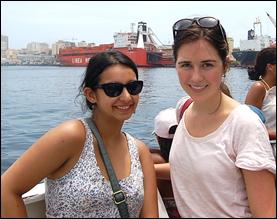
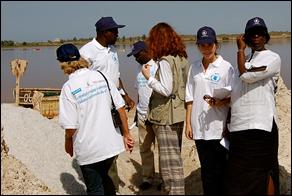
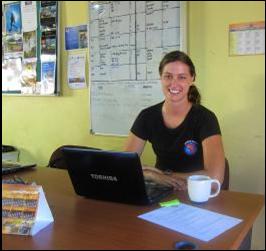
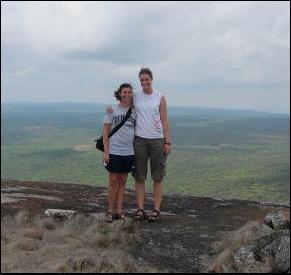
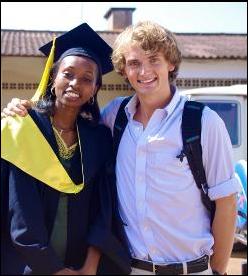
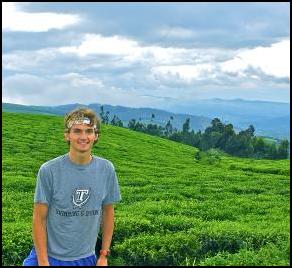
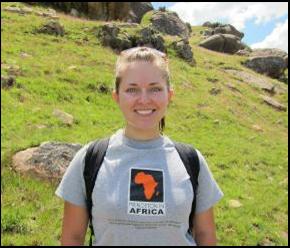
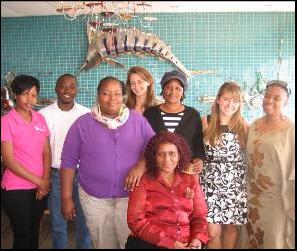
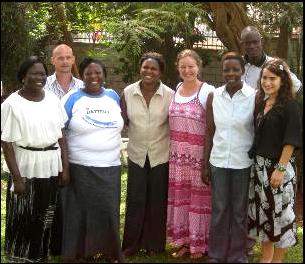
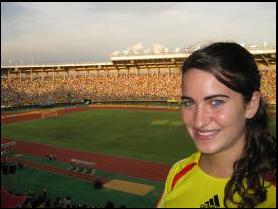






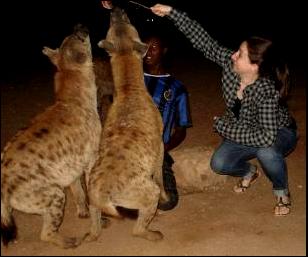
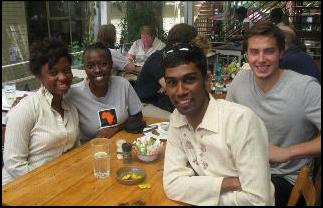
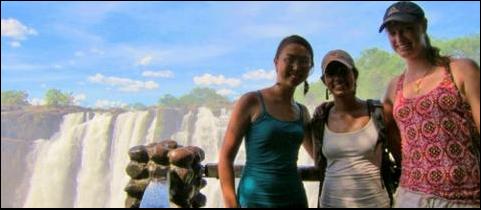
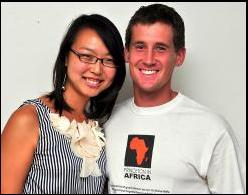
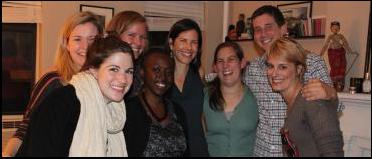

|
PiaF’s New President and President Emeritus |
|
Princeton in Africa is pleased to welcome James F. Robinson ’72 as the new President of Princeton in Africa’s Board of Trustees. Jim first became involved with Princeton in Africa in 2007 when his daughter Hilary ’07 served as a PiAf fellow with Plan Uganda in Kampala. Jim understands just how transformative a Princeton in Africa fellowship can be and brings tremendous energy and commitment to the organization. We look forward to his leadership as Princeton in Africa continues to grow. We would also like to take this opportunity to thank the indefatigable George Hritz ’69 for seven years of outstanding service as PiAf President. A generous leader, George was one of PiAf’s founding fathers who has mentored countless fellows and Princetonians over many years. PiAf looks forward to George’s continued involvement as President Emeritus. His years of guidance, insight, and passion are a large part of the reason PiAf is where it is today. On behalf of everyone at Princeton in Africa, a huge karibu to Jim and asante sana to George. PiAf President Emeritus George Hritz (left) at PiAf’s 2011 annual benefit with Piaf President James F. Robinson (right).
|
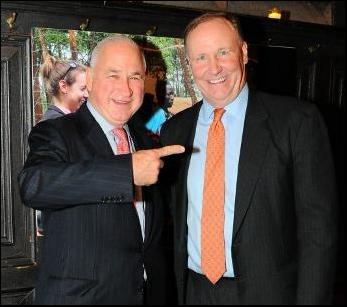

|
Blog Of The Month |
|
Name of blog: A New Chapter Written by: Emily Trautner, 2011-2012 Fellow at Plan Uganda
From a recent post: “Women Are...nurturing, kind, beautiful. Men are...strong, responsible, egoistic (=egotistical). These are just a few words my colleagues came up during a three-day gender awareness training last week. The training began with a definition of gender and ended with a personal declaration of things we would do differently after the training, and everything in between constituted an arduous journey that, in many ways, is just the beginning...” Read more of Emily’s blog here. |
